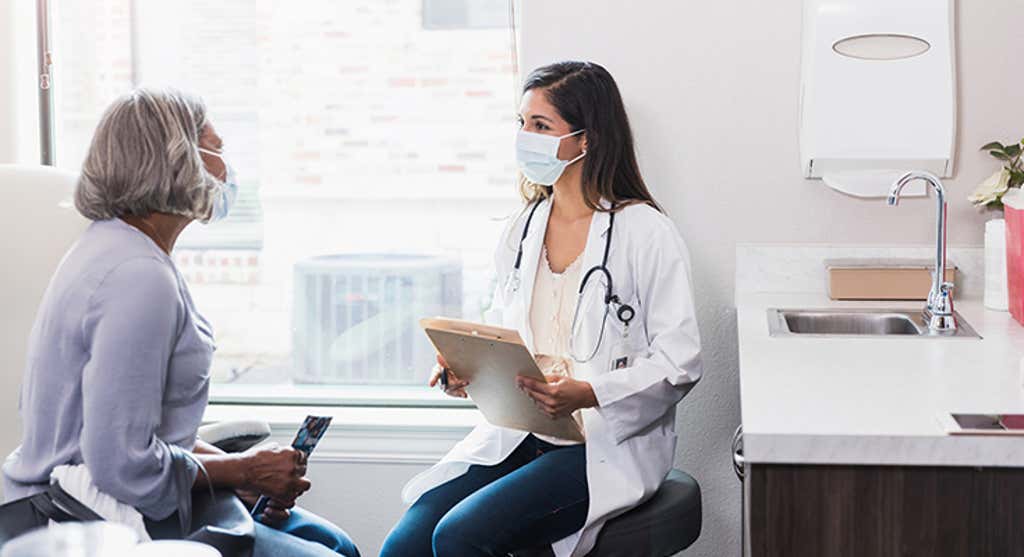
In-person care can be provided safely to your unvaccinated patients
CPSO reminds physicians that patients cannot be denied access to in-person care if they are unvaccinated or don’t have a recent negative COVID-19 test result.
In-person care can be provided safely — even in the absence of a negative test result or vaccination — by taking appropriate precautions, including screening patients and using necessary PPE. However, it is still not appropriate to deny in-person care to patients who screen positive, but have not yet had a COVID-19 test if in-person care is needed and adequate safety precautions can be implemented.
While you can encourage eligible patients to get vaccinated, physicians cannot restrict in-person care to patients who have been vaccinated. In fact, it is an expectation referenced in our Ending the Physician-Patient Relationship policy. Specifically, the policy states physicians “must respect patient autonomy with respect to lifestyle, health care goals, and treatment decisions, and not end the physician-patient relationship solely because the patient does not follow advice (for example, with respect to smoking cessation, drug or alcohol use, or the patient’s decision to refrain from being vaccinated or vaccinating his/her children).”
The College believes, however, that physicians can and should protect themselves and their patients by taking safety precautions for in-person care. The Ministry of Health’s COVID-19 Operational Requirements provides such guidance.
“Tell patients in advance (e.g., at appointment booking) about the safety precautions you’ve put in place”
Physical (Social) Distancing: Set up your physical workspace and manage your practice in a way that enables staff and patients to observe physical (social) distancing (e.g., barriers at screening points, limited/separated seating in waiting rooms, assigning in/out routes with signs and/or visual markings, limiting the use of some examination rooms, having patients wait in their cars or outside the office (if possible/appropriate), reducing appointment availability, staggering shifts within group practices, etc.).
Hygiene: Have systems in place to support hand hygiene among staff (e.g., before/after every patient) and make hand sanitizing stations available to patients.
Screening: Screen all patients in advance (when possible, through video, telephone or using web-based/online technologies), and at the point of care. If you are unable to safely isolate and/or provide care to patients with a positive screening result, redirect them to appropriate access points (e.g., emergency room if care is urgently needed). Also, know where to direct patients who require testing and when to report cases of COVID-19 to your local public health unit.
PPE: Follow public health guidelines regarding the appropriate PPE to use for the care being provided and avoid using more or higher levels of PPE than are required for the care being provided (e.g., airborne precautions if droplet precautions are recommended). The government published guidelines to help physicians optimize their supply of PPE, access alternate sources through the PPE Supplier Directory when experiencing shortages through established supply channels, and request PPE from the provincial stockpile in emergency situations and when all other efforts have been exhausted.
Patient Safety: Tell patients in advance (e.g., at appointment booking) about the safety precautions you’ve put in place, and ask them to bring and wear their own mask for their own safety and the safety of others, especially in instances where physical (social) distancing cannot be maintained. If patients do not have a mask, provide them with one or keep them isolated from other patients, and/or reschedule their appointment if necessary. Remember that some patients may have health conditions that make it difficult or unsafe to wear a mask.
Infection Prevention and Control: Infection prevention and control is more important than ever. Follow Public Health Ontario’s Best Practices for Environmental Cleaning for Prevention and Control of Infections in All Health Care Settings and the sector specific guidance provided by the Ministry of Health. Public Health Ontario also has online learning resources available to help build or refresh core competencies in this area. CPSO has also worked with Public Health to develop a resource specifically for the Independent Health Facilities (IHF) and Out of Hospital Premises (OHP) environment.












